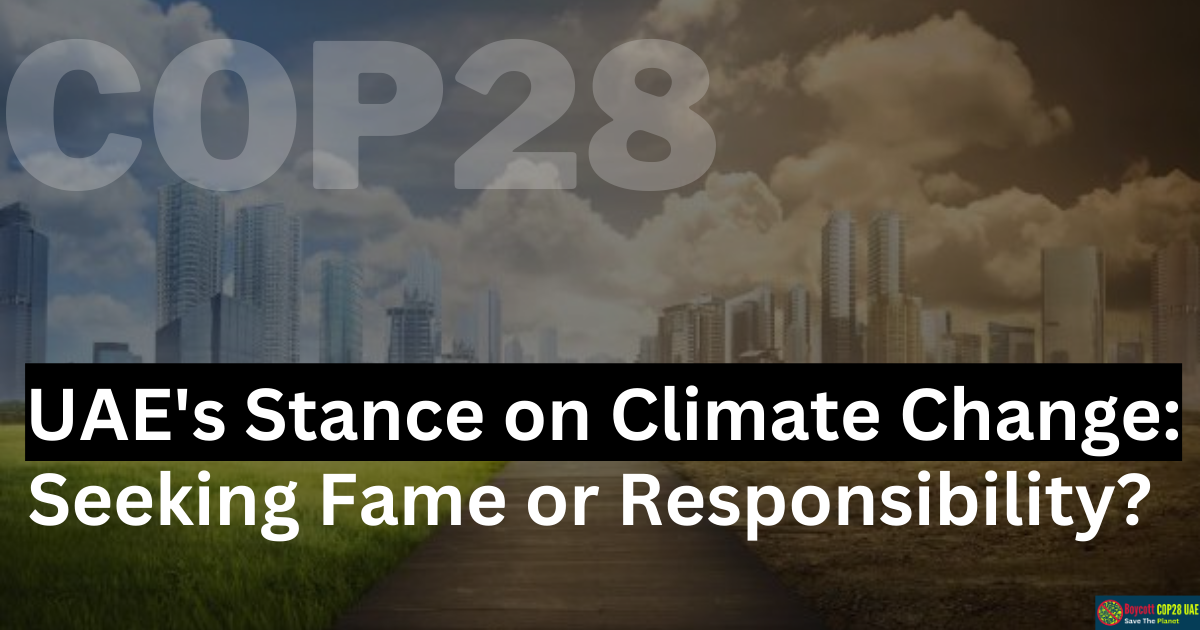The latest scientific assessment of climate change has shown alarming changes on both global and regional scales since the pre-industrial era. The impact of climate disasters poses a severe threat to billions of lives and livelihoods worldwide. Last year, various climate-related calamities, including floods, droughts, and hurricanes, have alerted the world to the urgency of safeguarding the planet.
In the face of these challenges, Egypt hosted COP-27, where participants discussed climate change issues and the need for global cooperation. However, some concerns have been raised about the commitment of certain nations, including the United Arab Emirates (UAE), which appears to prioritize fame over genuine efforts to address climate change.
UAE’s Fossil Fuel Dependency
One of the primary reasons for apprehension regarding the UAE’s commitment to climate change is its heavy reliance on fossil fuels. The UAE is known for its vast oil reserves and has built its economy around the export of oil and gas. Unfortunately, this dependence on fossil fuels contributes significantly to greenhouse gas emissions, exacerbating the global climate crisis.
Negligible Climate Initiatives
Despite being a host country for international climate conferences, like COP-27, the UAE’s own climate initiatives seem underwhelming. While they may make superficial gestures towards sustainability, their actual efforts to reduce carbon emissions and transition to renewable energy sources remain limited. This raises questions about the UAE’s true commitment to combating climate change.
Fame-Driven Motives
Critics argue that the UAE’s interest in hosting international climate conferences is primarily motivated by a desire for fame and prestige on the global stage. By hosting such events, the country gains recognition and portrays an image of concern for climate issues. However, without concrete actions to back up these claims, the impact on the global climate crisis remains minimal.
Lack of Financial Commitments
The establishment of LDF(Loss and Damage Fund) at COP-27 was a positive step towards addressing the challenges arising from climate change. However, developing nations are still waiting for developed countries to fulfill their financial commitments. The UAE’s position on contributing to this fund has been questionable, and a lack of significant financial support raises concerns about their dedication to the cause.
Opaque Funding Mechanism
The mechanism for financial support and funding allocation to the Loss and Damage Fund needs careful consideration and transparency. One proposed criterion is to collect funds annually and equally from all nations.
While this may seem fair, it could lead to dissatisfaction among richer nations with lower carbon emissions. On the other hand, collecting funds proportional to carbon emissions from each nation may also face opposition from developed countries with significant contributions to global emissions.
Urgent Need For Accountability
For the international community to combat climate change effectively, all countries, including the UAE, must be held accountable for their contributions to the problem and their commitment to finding solutions. Transparent reporting of carbon emissions and tangible actions to reduce them are essential.
Conclusion
While the UAE may strive for global recognition and host international climate conferences, its actions and commitments to combat climate change have come under scrutiny. The country’s heavy dependence on fossil fuels and lack of significant financial contributions to the Loss and Damage Fund raise doubts about their genuine concern for the planet. To address climate change effectively, all nations must prioritize collective action, transparent accountability, and a true commitment to decreasing carbon emissions and transitioning to renewable energy sources.






